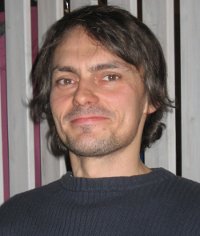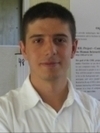Tutorials will be held on the first day of the conference.
Department:
Machine Vision and Pattern Recognition Laboratory
Lappeenranta University of Technology
P.O. Box 20, FIN-53851
Lappeenranta, Finland
Homepage: http://vision.cs.tut.fi/personal/JoniKamarainen/ Presentation title: Gabor features in Image Processing
Abstract:
2D Gabor filters have maintained their popularity as a feature extraction method in computer vision and image processing for three decades. The frequently cited article by Nobel laureate Dennis Gabor dates back to 1946, but John Daugman's article in 1985 boosted interest in vision community. During the 00's the research activity has actually increased according to IEEE Xplore database. The most important reason for the increase is in the wide success in emerging application areas, such as biometric authentication. The Daugman's Iris code is the most successful approach for iris recognition (Daugman 2006), bunch graph derived methods are among the best in large scale face recognition contests, and success in fingerprint matching is also remarkable. Even the old adage of Gabor filters resembling the simple cells in the visual cortex has recently been resurrected. We can assume that Gabor filters will maintain their important role also in the future.
During this presentation I will explain the facts why still, after 30 years, features based on such a simple principle as the Gabor function provide remarkable results in many applications of computer vision and image processing.
Short Biography:
Dr. Kamarainen received MSc (Eng.) and DSc (Tech.) degrees, both in information processing (Comp. Sc.), from Lappeenranta University of Technology in 1999 and 2003, respectively. He is a founding member and vice director of the Machine Vision and Pattern Recognition Laboratory, Lappeenranta University of Technology where he was appointed Professor of Information Society Technologies in 2008. His research interests include computer vision, image analysis and pattern recognition. He is a chairman of the Pattern Recognition Society of Finland, and member of International Association for Pattern Recognition (IAPR).
Department:
Faculty of Computer and Informatics
Istanbul Technical University
Turkey
Homepage: http://face.cs.kit.edu/
Presentation title: Benchmarking Facial Image Analysis Technologies (BeFIT)
Abstract:
In the past several decades, facial image analysis has attracted continuous attention in computer vision, pattern recognition and machine learning areas, owing to its scientific challenges in both psychological interpretation and computational simulation, as well as its huge potential in real-world applications. Much progress has been achieved in the last two decades; however, researchers in the field also meet bafflement and challenges on the comprehensive and unbiased evaluation of the related technologies, which may prevent them from discovering the actual state of the art. BeFIT –Benchmarking Facial Image Analysis Technologies– is an international collaborative effort on standardizing the evaluation of facial image analysis technologies. The objective is to bring together different face analysis evaluations and provide a medium for researchers to discuss about different aspects of face analysis. This interaction would also lead to new datasets or combination of existing datasets. The BeFIT webpage (URL: http://face.cs.kit.edu/befit) is planned to serve as a repository of facial image analysis technologies benchmarks and the regular workshops are intended to serve as a medium where the researchers can discuss about different aspects of face analysis. In this talk, the Benchmarking Facial Image Analysis Technologies –BeFIT initiative will be introduced and an overview of the proposed challenges, benchmarks, and the provided data sets within the BeFIT framework will be presented.
Short Biography:
Dr. Ekenel received his B.Sc. and M.Sc. degrees in Electrical and Electronic engineering from Bogazici University in 2001 and 2003, respectively, and Ph.D. degree in Computer Science from the University of Karlsruhe (TH) in 2009. He has founded and has been leading the “Facial Image Processing and Analysis” group at the Department of Computer Science in Karlsruhe Institute of Technology. He was the task leader for face recognition in the European Computers in the Human Interaction Loop, CHIL, project, an integrated project under the sixth framework programme, and he organized face recognition evaluations within the CLEAR 2006, 2007 international evaluation campaigns. He has been responsible for face recognition in the German Excellence Cluster on Humanoid Robots. He has also been leading the face recognition efforts and coordinating face detection and face recognition evaluations within the large scale French-German research programme Quaero, in which his technology is used for the analysis and indexing of multimedia content such as images or videos from the web. His face analysis technology has been used by several research labs and companies and has taken part in several demo and press events. He has received the EBF European Biometric Research Award in 2008 for his contributions to the field of face recognition. His research has led more than 60 publications in international journals, conferences, and workshops. In addition to the scientific work, many real-world systems have been developed based on his algorithm. With these systems, with his team, he received the Best Demo Award at the IEEE International Conference on Automatic Face and Gesture Recognition in 2008. Since January 2011, he has been coordinating the Benchmarking Facial Image Analysis Technologies (BeFIT) initiative. He is the primary organizer of the BeFIT workshops 2011 and 2012.


